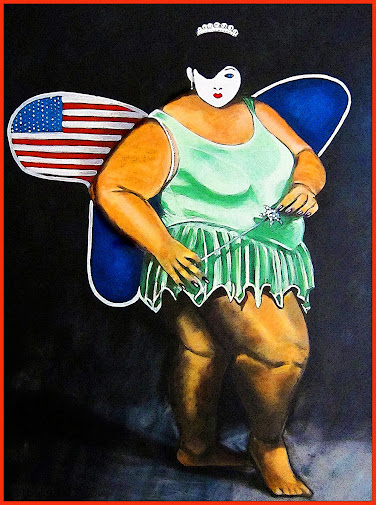''Eli discovers music hidden beneath the ivory keys''
Although perhaps we don't often ponder the many different ways
we use to communicate and interact with each other, .... as an artist,
I often find myself in awe of how innovative the human
species can be at finding ways to express itself.
For instance: using words > written/spoken/ or signed,
through touch, movement, images > moving or still,
sound > organized(music) and or un-organized,
visual > paintings, sculptures, installations,
i-Thingy's > all things based on binary code,
etc. etc. etc.
Words(written or spoken) are crucial when it comes to
communication, but words, as definitive as they may seem,
are more often than not mere approximations and highly
ambiguous in my view.
How so? you may ask.
Take the word ''red'' for instance: We may agree on
defining the word red as a word for a specific color
but how we interpret that ''red'' will vary from
person to person: crimson red, vermillion red,
cadmium red, post-office red, fire-engine red,
etc. etc..............
Having said all this, now let me ask you:
How would you
define/interpret the word ''special''?
Depending on circumstances, would you define
special as in: better than usual, extraordinary, top notch,
exceptional, etc. etc.?
Or: different from what's usual, a person with special needs,
or special as in difficult to be around because of a behaviour
pattern different from the norm, or ...... something else?
*
Perhaps ''special'' is a term used today mostly in a
positive way(exceptional) but not so long ago,
being described by others as ''special'' as far as I
can remember, was not great.....
Today we have many more terms for people/kids
who used to be labeled ''special'':
Autism Spectrum disorder, anxiety disorder, conduct
disorder, ADHD, eating disorder, PTSD post-traumatic
stress disorder, and so on. But also: Special, as viewed
through a positive lens: Gifted, different, creative.
*
When I was a teenager I had a summer job teaching
music to ''special'' people in an institution that
housed hundreds of special people.
''Special'' then meant ''hard to understand, hard to handle,
hard to communicate with and hard to be with''.
But among my special students, there were also three
pupils (people) that I would
classify as very gifted although...... their language and
communication skills could do with a bit of an upgrade.
Though I was scared every day I went to work and
absolutely shattered every evening when I came home,
I did learn many invaluable and crucial life lessons
about the term ''special'' and how devastating the
consequences of that term can be at times.
My time all through school was horrible.
I was labeled ''special''(peculiar) by my class mates
already in grade 1 and not until I started
gymnasium(secondary school) did the
term change meaning from different/peculiar into ''gifted,
different in a good way''.
Straight out of college I auditioned for a placement
at the Conservatorium of music. My audition went well
and I was accepted and as soon as I started my studies
I knew that I was finally among ''my peeps'',
that is, in the company of others also labeled ''special''.
*
''We define our worlds with the words we use''
someone once said.
Though I agree with those words, I would like to add some.
We also use art to express how we experience
the world we live in.
Art is not only stuff that we find in galleries, museums and
parks.
Art, in my view, is an outer expression of an inner
experience.
And whether we use words, music, marble, clay
or any other medium to express our inner experiences,
we are all special, top notch in our own particular way.
''I believe that every one of us are born with
at least one gift.
A gift that only bears fruit if constantly nourished
and persistently cherished .''
(Citizen Z)
about the image: photo edited in Elements
title: ''Eli discovers music hidden beneath the ivory keys''
ps: about Eli's right hand finger....How on earth did he do that????








